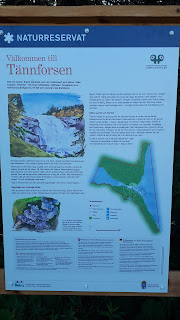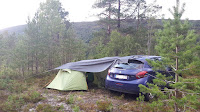Day three started off with some fabulous sunshine over our campsite. The night was quite comfortable and not as cold as we expected sleeping so near the water.
We made some breakfast and headed back to the car.
Our plan for this day was to visit Docksta
via ferrata site. It is situated in
Höga Kusten, the high coast, which according to them is the highest coast line in the world.
There is a commercial via ferrata. It is a bit pricey, especially if you are used to the free ones in other parts of Europe. This one is expensive even if you have your own gear. We were quite surprised, but we had decided on trying it so we did.
Dad had his harness with him, but needed the ferrata kit with helmet. Bro and I had our own gear.
So, after lunch we headed up the wall.


We chose to begin with the easy "white" route, just to see how dad was doing. Oh, and me of course. I wasn't sure of how my body would cope with this kind of climbing, being in the beginning of the third trimester and all.
The route split a bit higher up into an easy and a difficult one. The first part went very nicely so we decided on the hard one. This route was actually pretty much like the easy one, with the distinct difference of being more exposed, so requiring more mental control.
Actually it is quite exposed at places and I was a bit surprised that it required climbing up holding on to the wire at many places, meaning ascent without gripping the wire was not possible. Gloves are an absolute must because the ascent is very hard on the skin due to the wire gripping. Disappointing...
Dad was quite upset for a part of the way. The route was way too exposed for him and we needed to aid him in choices for gripping and stepping. Well, we must say in our defense that he has throughout his life been quite an adventurer, so we were pretty sure this would work. He's more sedentary life as a retiree has softened him up a bit, but with patience and positivity we reached the top. On arrival he suddenly burst out in excitement and laughter over having managed this project.

We sat at the top for a while and had some fruit, cupcakes and water, enjoying the view, before hiking downward again.

The route down was almost as steep as coming up. We chose the "blue" route, that passes a little cave area.
The descent was a bit hard on my pelvis, but I made it, as did dad with his old hip joints.
Afterward we filled up our water supplies and found a nature reserve close by for over-nighting. The place was a bit popular and there were a couple of caravans and another car with a couple in a tent.

Still it was remote enough that we felt safe to stay there for the night.
After a nice dinner we decided to bunk down for the night.
Next morning our first view out of the tent was filled with fog. It almost
looked like we were inside of a cloud. The tarp we had set up was still
hanging in its place and soon we were making breakfast under it. Coffee,
bread, cheese, yogurt and the last of the muesli.
We had several
small showers of rain during our breakfast, but the tarp and our three
legged camp stools made life very easy. Having the car so close by was
very nice too. Pretty soon we had everything packed and headed off
toward
Åre.

On the way we stopped in
Sollefteå,
a smallish town where our dad lived as a young man. He had quite a walk
down memory lane. The old center street was as he remembered, but
without some of the shops. Otherwise the town seemed to be slowly
starving. Every other shop was empty. After a coffee and a short walk we
continued on our way.


Next we stopped by
Döda fallet,
the Dead fall. It used to be an impressive whitewater rapid. Back in
1790 and before timber and logging was an important trade, but timber
was destroyed in the rapid. Also salmon could not pass which made
fishing good below, but not above. It was decided to build a canal to
bypass the rapid up to the Ragunda lake above. This work had quite some
obstacles as the canal bottom was sand and sediment and kept flowing
back in. Men died in rock-slides and such. Also the work was
continuously sabotaged by locals who were afraid of losing fishing
income and work with log portaging. Also farmers were afraid of damage
to their farmlands along the way.

Anyhow,
in 1795 the bypass canal reached the lake, but the river flow was slow,
so the dam was closed. What no one had anticipated was an unexpectedly
large spring flood the year after. An unprecedented rain fall caused the
lake to leak into the canal and began eating away at the sediment. This
became the 1796 flood disaster, the largest historical environmental
disaster in Sweden. The whole of Ragunda lake, a 1000 million liters of
water was emptied within a 4 hour period, moving as a flood wave through
the canal and the surrounding forest and villages.
The sediment redeposited at
Indalsälven delta, where we spent our first tent night.
It
was quite fascinating to see all the rocks and boulders of the dead
fall that normally make out a bottom of a river. The area has loads of
glacial potholes,
cylindrical holes drilled into the rock by water and rotating gravel,
some of which had burrowed a hole straight through a boulder. There is
something really fascinating about rocks.
After the walk around the Dead
fall we headed off toward the west.
After some additional driving we came to the campsite where I'd decided we would spend the night, since I was craving a shower,
Ristafallet camping. This time at a live waterfall called
Rista.
It was quite rainy when we arrived so not having to pitch the tent in
that weather was a relief. We spent the night in a tiny cabin, with no
running water, just beds, fridge and a cook stove. There was a service
building with a kitchen, washing machine and showers and toilets. Just
what we needed.
Before dinner that evening Ben and I
headed down to look at the actual fall. The force of waterfalls has this
strange allure. I just feel I want to get as close as possible. Ben
actually went closer than I did. I had this nervous feeling about the
slickness of the rocks and feeling a bit heavy and inflexible I decided
to play it safe.
 All rivers we saw on the way were glacial water. Our first stop was at Riddersprånget along the river Sjoa, The knights Leap the spot is called. The story is that a knight had fallen for someone elses bride. She had a liking for him too, so he stole her and they fled to the river where he jumped over a gorge with her in his arms. The other knights were chasing close behind, and he actually pushed one of his own men into the water to show the pursuers what would happen to them if they followed.
All rivers we saw on the way were glacial water. Our first stop was at Riddersprånget along the river Sjoa, The knights Leap the spot is called. The story is that a knight had fallen for someone elses bride. She had a liking for him too, so he stole her and they fled to the river where he jumped over a gorge with her in his arms. The other knights were chasing close behind, and he actually pushed one of his own men into the water to show the pursuers what would happen to them if they followed.  Our second stop was at Stuttgongfossen, a 22 m fall. The forest around the area was fabulous too. It was filled with moss-like lichen. There was so much of it that the forest bed was almost white grayish-green.
Our second stop was at Stuttgongfossen, a 22 m fall. The forest around the area was fabulous too. It was filled with moss-like lichen. There was so much of it that the forest bed was almost white grayish-green. 






















































